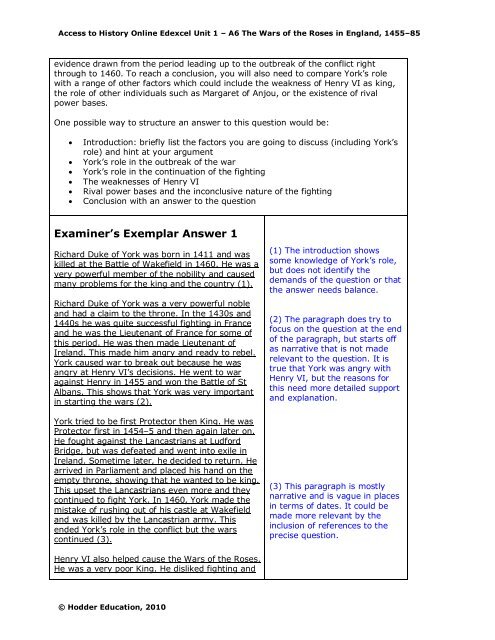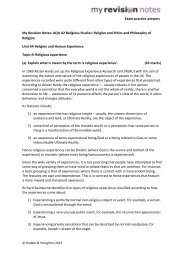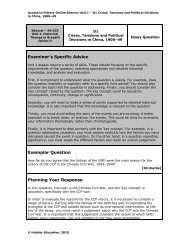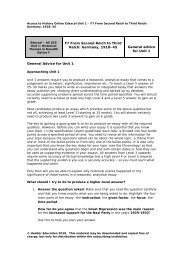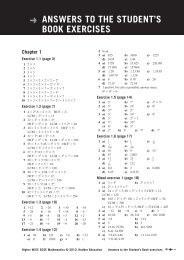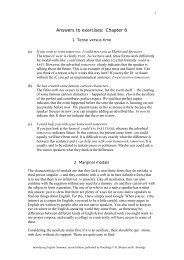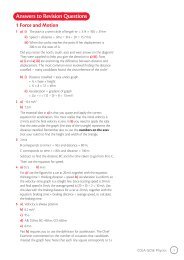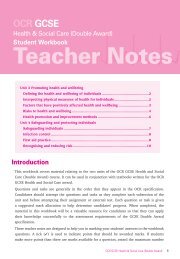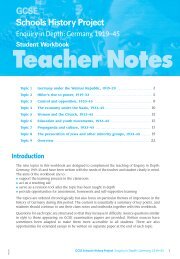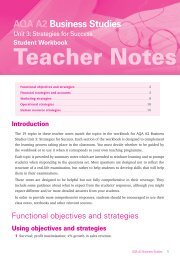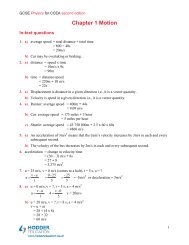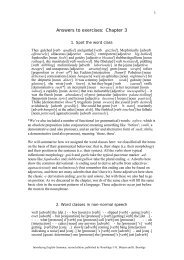Edexcel – Unit 1 - Access to History 2
Edexcel – Unit 1 - Access to History 2
Edexcel – Unit 1 - Access to History 2
You also want an ePaper? Increase the reach of your titles
YUMPU automatically turns print PDFs into web optimized ePapers that Google loves.
<strong>Access</strong> <strong>to</strong> His<strong>to</strong>ry Online <strong>Edexcel</strong> <strong>Unit</strong> 1 – A6 The Wars of the Roses in England, 1455–85evidence drawn from the period leading up <strong>to</strong> the outbreak of the conflict rightthrough <strong>to</strong> 1460. To reach a conclusion, you will also need <strong>to</strong> compare York’s rolewith a range of other fac<strong>to</strong>rs which could include the weakness of Henry VI as king,the role of other individuals such as Margaret of Anjou, or the existence of rivalpower bases.One possible way <strong>to</strong> structure an answer <strong>to</strong> this question would be:• Introduction: briefly list the fac<strong>to</strong>rs you are going <strong>to</strong> discuss (including York’srole) and hint at your argument• York’s role in the outbreak of the war• York’s role in the continuation of the fighting• The weaknesses of Henry VI• Rival power bases and the inconclusive nature of the fighting• Conclusion with an answer <strong>to</strong> the questionExaminer’s Exemplar Answer 1Richard Duke of York was born in 1411 and waskilled at the Battle of Wakefield in 1460. He was avery powerful member of the nobility and causedmany problems for the king and the country (1).Richard Duke of York was a very powerful nobleand had a claim <strong>to</strong> the throne. In the 1430s and1440s he was quite successful fighting in Franceand he was the Lieutenant of France for some ofthis period. He was then made Lieutenant ofIreland. This made him angry and ready <strong>to</strong> rebel.York caused war <strong>to</strong> break out because he wasangry at Henry VI’s decisions. He went <strong>to</strong> waragainst Henry in 1455 and won the Battle of StAlbans. This shows that York was very importantin starting the wars (2).York tried <strong>to</strong> be first Protec<strong>to</strong>r then King. He wasProtec<strong>to</strong>r first in 1454–5 and then again later on.He fought against the Lancastrians at LudfordBridge, but was defeated and went in<strong>to</strong> exile inIreland. Sometime later, he decided <strong>to</strong> return. Hearrived in Parliament and placed his hand on theempty throne, showing that he wanted <strong>to</strong> be king.This upset the Lancastrians even more and theycontinued <strong>to</strong> fight York. In 1460, York made themistake of rushing out of his castle at Wakefieldand was killed by the Lancastrian army. Thisended York’s role in the conflict but the warscontinued (3).(1) The introduction showssome knowledge of York’s role,but does not identify thedemands of the question or thatthe answer needs balance.(2) The paragraph does try <strong>to</strong>focus on the question at the endof the paragraph, but starts offas narrative that is not maderelevant <strong>to</strong> the question. It istrue that York was angry withHenry VI, but the reasons forthis need more detailed supportand explanation.(3) This paragraph is mostlynarrative and is vague in placesin terms of dates. It could bemade more relevant by theinclusion of references <strong>to</strong> theprecise question.Henry VI also helped cause the Wars of the Roses.He was a very poor King. He disliked fighting and© Hodder Education, 2010


